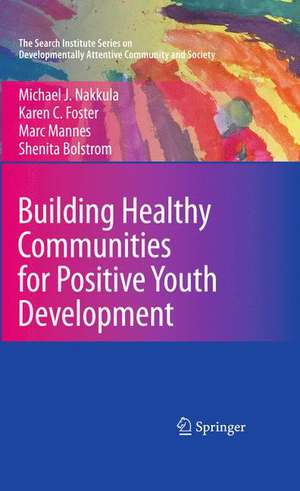Building Healthy Communities for Positive Youth Development: The Search Institute Series on Developmentally Attentive Community and Society, cartea 7
Autor Michael J. Nakkula, Karen C. Foster, Marc Mannes, Shenita Bolstromen Limba Engleză Hardback – 3 iun 2010
| Toate formatele și edițiile | Preț | Express |
|---|---|---|
| Paperback (1) | 692.24 lei 6-8 săpt. | |
| Springer Us – 30 noi 2011 | 692.24 lei 6-8 săpt. | |
| Hardback (1) | 641.71 lei 6-8 săpt. | |
| Springer Us – 3 iun 2010 | 641.71 lei 6-8 săpt. |
Preț: 641.71 lei
Preț vechi: 754.95 lei
-15% Nou
Puncte Express: 963
Preț estimativ în valută:
122.80€ • 131.31$ • 102.38£
122.80€ • 131.31$ • 102.38£
Carte tipărită la comandă
Livrare economică 17 aprilie-01 mai
Preluare comenzi: 021 569.72.76
Specificații
ISBN-13: 9781441957436
ISBN-10: 144195743X
Pagini: 240
Ilustrații: XIV, 189 p. 2 illus.
Dimensiuni: 155 x 235 x 20 mm
Greutate: 0.45 kg
Ediția:2010
Editura: Springer Us
Colecția Springer
Seria The Search Institute Series on Developmentally Attentive Community and Society
Locul publicării:New York, NY, United States
ISBN-10: 144195743X
Pagini: 240
Ilustrații: XIV, 189 p. 2 illus.
Dimensiuni: 155 x 235 x 20 mm
Greutate: 0.45 kg
Ediția:2010
Editura: Springer Us
Colecția Springer
Seria The Search Institute Series on Developmentally Attentive Community and Society
Locul publicării:New York, NY, United States
Public țintă
Professional/practitionerCuprins
Transformation, Affirmation, and Blended Models.- Strategic Care, Sector by Sector: Traverse Bay Area’s GivEm40 24.7.- The Forgotten Neighborhoods: Moorhead, Minnesota’s Healthy Community Initiative.- Pursuing “The Tipping Point”: Portland, Oregon’s Take the Time Initiative.- Community Sustainability: Orlando’s Healthy Community Initiative.- We Are Not a Program! St. Louis Park, Minnesota’s Children First Initiative.- Partnering with Prevention: The Lawton/Fort Sill, Oklahoma, Community Coalition.- “Leaderful” Communities: The McPherson, Kansas, Tri-County Asset-Building Initiative.- The Next New Frontier: Nevada’s Healthy Communities Coalition of Lyon and Storey Counties.- Project Postscript: Resisting the Template.
Recenzii
"Building Healthy Communities for Positive Youth Development comes to us during a time when many are calling for significant school reform and worrying about growing rates of school dropouts and cases of bullying and youth suicides. Whereas many schools are
instituting antibullying programs or “dare to care” suicide prevention efforts or offering alternative programs for students at risk of dropping out, they by and large follow the deficit model approach.
Nakkula et al. remind us that canned programs of reform, built on a view of youths as being diagnosed with “problems” to be solved, well intentioned though they may be, will never prove so powerful as that group of committed individuals—the religious leaders, the teachers, the business owners—who can reflect on their deeply held beliefs and then thoughtfully act in new ways that support healthy development of our youths and our communities."
- Ellen L. Nuffer
PsycCRITIQUES - July 27, 2011, Vol. 56, Release 30, Article 6
instituting antibullying programs or “dare to care” suicide prevention efforts or offering alternative programs for students at risk of dropping out, they by and large follow the deficit model approach.
Nakkula et al. remind us that canned programs of reform, built on a view of youths as being diagnosed with “problems” to be solved, well intentioned though they may be, will never prove so powerful as that group of committed individuals—the religious leaders, the teachers, the business owners—who can reflect on their deeply held beliefs and then thoughtfully act in new ways that support healthy development of our youths and our communities."
- Ellen L. Nuffer
PsycCRITIQUES - July 27, 2011, Vol. 56, Release 30, Article 6
Notă biografică
Michael J. Nakkula, Ed.D., is a practice professor of education within the Division of Applied Psychology and Human Development at the University of Pennsylvania’s Graduate School of Education, where he serves as the director of a master’s program in school and mental health counseling. Nakkula teaches courses on adolescent development and the intersection of counseling, mentoring, and education within urban public schools. Prior to assuming his current faculty position, he was the longtime codirector of Harvard’s Risk and Prevention master’s program, where he designed and studied a number of initiatives that support the developmental opportunities for low-income youth. For this work he was named Harvard’s initial recipient of the Kargman Junior Chair for Human Development and Urban Education Advancement (1998–2004). Nakkula is the lead author (with Eric Toshalis) of Understanding Youth: Adolescent Development for Educators (Harvard Education Press, 2006), and is the coeditor of a special journal issue on the ways in which youth mentoring relationships are organized, assessed, and understood to promote best practices within different settings. He finds particular joy in helping to coach his sons’ (Lukas and Sam) youth hockey and baseball teams.
Karen C. Foster, Ed.D., is a former research associate at the Harvard Graduate School of Education where she enjoyed a longterm collaboration with Michael Nakkula. She trained in child and adolescent development at the former Cambridge Child Guidance Center and in the Behavioral Medicine department, also affiliated with The Cambridge Hospital, in Cambridge MA. Her early research was a study of Boston inner city students' experiences of stress and coping. She has spent the past four years as an external evaluator and consultant to the Ohio Board of Regents studying the impact of a state wide initiative to improve the quality of science and mathematics teacher education in the public schools. Herstint in Ohio provided a valuable opportunity to study the unique challenges to higher educational access posed by rural communities. The experience of working on the National Asset-Building Case Study Project was a primary force in shaping her deep interest in research approaches that authentically capture the work of social reforms. She has applied the model developed on the Case Study Project to other areas including immigrant healthcare practices, nutrition reform, service learning, and police profiling.
Marc Mannes, Ph.D., currently leads the Chicago office of Booz Allen Hamilton, a strategy, operations, and technology consulting firm serving government clients. Marc spent a decade as director of applied research at Search Institute, where he oversaw the organization’s community research agenda and the extension of the Developmental Assets Frameworks to children. His career has focused on the intersections of applied research, policy formulation and implementation, program and product development, organizational and community change, and training. Mannes is coeditor and contributor to Balancing Family-Centered Services and Child Well-Being: Exploring Issues in Policy, Practice, Theory, and Research (Columbia University Press, 2001). He also served as a contributing author to Other People’s Kids: Social Expectations and American Adults’ Involvement with Children and Adolescents (2003), also part of the Search Institute Series on Developmentally Attentive Community and Society. Mannes lives north of Chicago in Wilmette, Illinois, with his wife, Karen, and their two daughters, Lilia and Natalie.
Shenita Bolstrom, MS, is a clinical research associate in the Neuromodulation business at Medtronic, Inc., global leader in medical technology, headquartered in Minneapolis, MN. Prior to joining Medtronic, Inc., she was field research coordinator at Search Institute, where she worked on research projects in the areas of community and social change,families and parenting, and youth development programs and practices. Shenita earned her Bachelor of Arts degree in psychology and sociology from the University of Wisconsin–Milwaukee and her master’s degree at the University of Wisconsin–Madison. When not at work, she’s out training for and completing marathons.
Karen C. Foster, Ed.D., is a former research associate at the Harvard Graduate School of Education where she enjoyed a longterm collaboration with Michael Nakkula. She trained in child and adolescent development at the former Cambridge Child Guidance Center and in the Behavioral Medicine department, also affiliated with The Cambridge Hospital, in Cambridge MA. Her early research was a study of Boston inner city students' experiences of stress and coping. She has spent the past four years as an external evaluator and consultant to the Ohio Board of Regents studying the impact of a state wide initiative to improve the quality of science and mathematics teacher education in the public schools. Herstint in Ohio provided a valuable opportunity to study the unique challenges to higher educational access posed by rural communities. The experience of working on the National Asset-Building Case Study Project was a primary force in shaping her deep interest in research approaches that authentically capture the work of social reforms. She has applied the model developed on the Case Study Project to other areas including immigrant healthcare practices, nutrition reform, service learning, and police profiling.
Marc Mannes, Ph.D., currently leads the Chicago office of Booz Allen Hamilton, a strategy, operations, and technology consulting firm serving government clients. Marc spent a decade as director of applied research at Search Institute, where he oversaw the organization’s community research agenda and the extension of the Developmental Assets Frameworks to children. His career has focused on the intersections of applied research, policy formulation and implementation, program and product development, organizational and community change, and training. Mannes is coeditor and contributor to Balancing Family-Centered Services and Child Well-Being: Exploring Issues in Policy, Practice, Theory, and Research (Columbia University Press, 2001). He also served as a contributing author to Other People’s Kids: Social Expectations and American Adults’ Involvement with Children and Adolescents (2003), also part of the Search Institute Series on Developmentally Attentive Community and Society. Mannes lives north of Chicago in Wilmette, Illinois, with his wife, Karen, and their two daughters, Lilia and Natalie.
Shenita Bolstrom, MS, is a clinical research associate in the Neuromodulation business at Medtronic, Inc., global leader in medical technology, headquartered in Minneapolis, MN. Prior to joining Medtronic, Inc., she was field research coordinator at Search Institute, where she worked on research projects in the areas of community and social change,families and parenting, and youth development programs and practices. Shenita earned her Bachelor of Arts degree in psychology and sociology from the University of Wisconsin–Milwaukee and her master’s degree at the University of Wisconsin–Madison. When not at work, she’s out training for and completing marathons.
Textul de pe ultima copertă
The Healthy Communities • Healthy Youth (HC • HY) project has provided grassroots support for the creation of robust, welcoming environments not only for children and adolescents at risk but for all youth. Building Healthy Communities for Positive Youth Development explains the Developmental Assets framework in depth and demonstrates how eight local initiatives across the country have adapted and implemented it to fit the unique cultures and resources of their neighborhoods and the needs and strengths of their young people. Stakeholders collaborating in the process include parents, educators, politicians, service providers, law enforcement, volunteers, and—as active participants instead of merely recipients of services—youth themselves.
In this visionary book, the authors provide readers with a flexible, living blueprint for promoting the well-being of children and teenagers. Areas of coverage include:
In this visionary book, the authors provide readers with a flexible, living blueprint for promoting the well-being of children and teenagers. Areas of coverage include:
- Core themes of the eight HC • HY initiatives.
- The use of an asset-based common language among participants.
- Building common ground among the various sectors involved in the initiatives.
- The varied roles of young people within the initiatives.
- Research design and methodology; data collection and interpretation.
- Funding issues and challenges.
Caracteristici
Explores how youth development and community development intersect and influence one another Focuses on multiple manifestations of a community-designed approach rather than a replication of a national model or program Builds bridges between theory and practice Provides a unique window into what is arguably the broadest grassroots community organizing movement for youth development in the country































